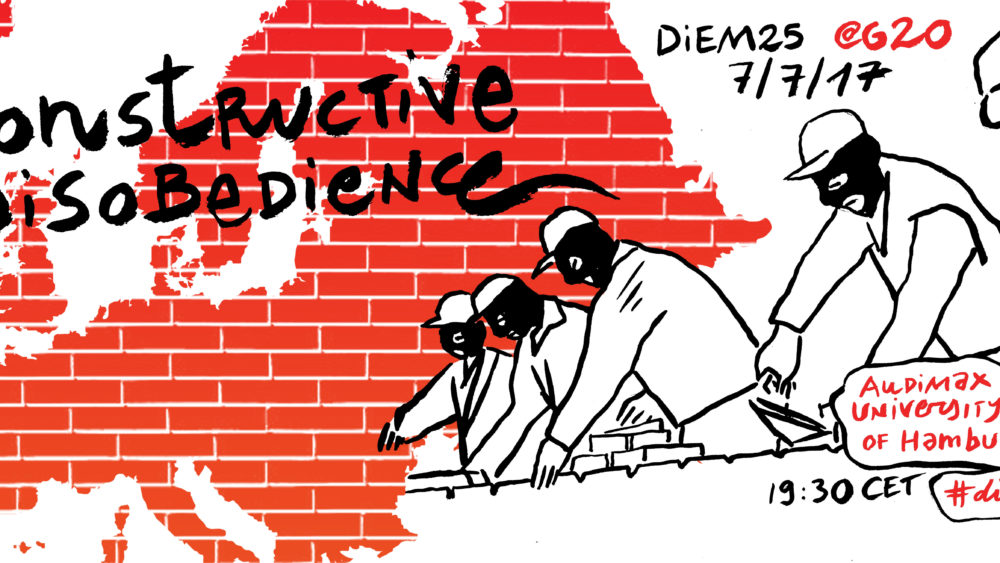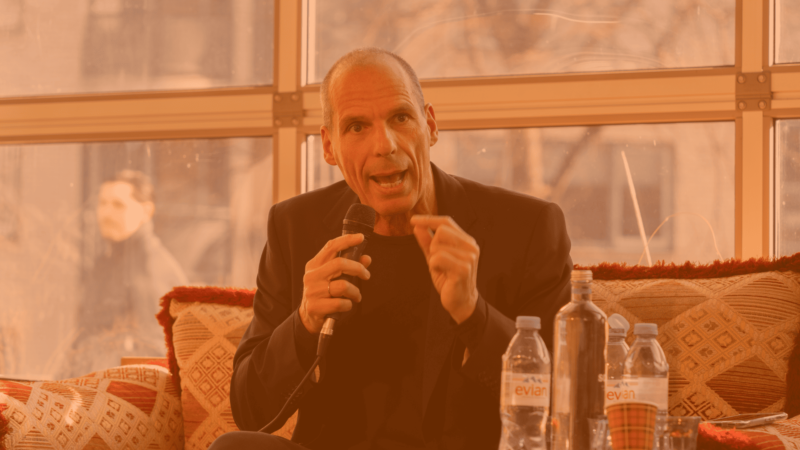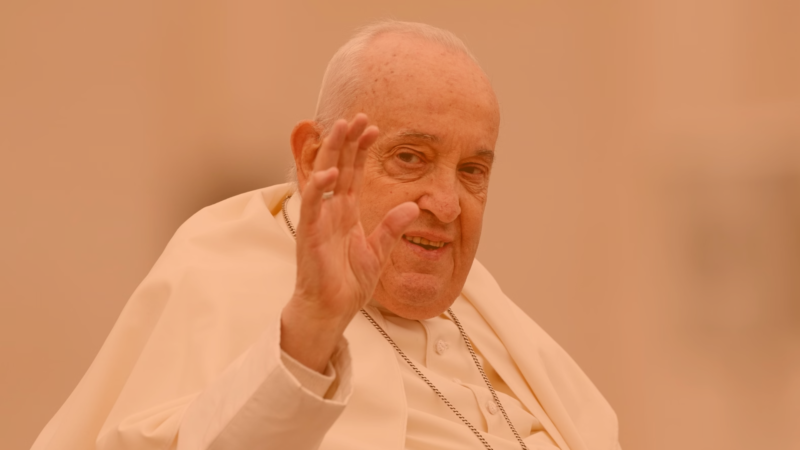Statement of the Provisional National Committee of DiEM25-Germany at the G20 summit in Hamburg
“All citizens have the right to freely express their opinions and to gather peacefully for protest. The freedom of assembly, as well as freedom of expression, is a basic pillar of every free and pluralistic society.”
This statement appeared on the website of the human rights organisation, Amnesty International last week in response to recent incidents in Hamburg, specifically the ban on protest camps and the restriction on overnighting, and the general ban on demonstrations in the city. Although these prohibitions were lifted by the Constitutional Court, the Administrative Court of Hamburg chose to reinstate them in a modified form. It is well known amongst lawyers that the administrative courts tend to be more conscious of political interpretation than the Constitutional Court. The purpose of such bans is to preemptively prevent “militant extremists” from having access to a refuge as well as places of potential disturbance.
In 2013 the Turkish Prime Minister, Reccep Tayyip Erdoğan, ordered the evacuation of protestors in Gezi Park on the premise that “terrorists” and “riffraff” were infiltrating the ranks of demonstrators. At the time, this crackdown was strongly condemned by leading politicians keen to reaffirm the democratic value of assembly and freedom of opinion. And yet, today, the leaders of the protest movements in Hamburg are facing similar rhetoric and restrictions. Reducing the creative and diverse G20 protest to just ‘a bunch of militants’ is a calculated simplification of the protest. The predicted total number of demonstrators is in the hundreds of thousands, each protesting uniquely, while police estimate that the number of violent demonstrators may be in the region of 8,000.
Freedom of assembly in the opinion of the Federal Constitutional Court
In the opinion of the Federal Constitutional Court and among the most respected German constitutional jurists, freedom of assembly does not merely include conventional demonstrations. Vigils, silent protests, human chains and protest camps are also constitutionally protected. It is not only misleading, but also inaccurate to refer to ‘approvals’ or ‘restrictions’ for such gatherings. Such terminology is reminiscent of the former police state, when the Constitution had not yet been approved. Nowadays, political assemblies do not have to be ‘approved’ by the authorities; they are universally permitted and the only bureaucratic condition is that they need to be registered.
Now, if other basic liberties are under threat, then assemblies may be restricted and, in extreme cases, even banned. However these are exceptional circumstances, which must be reasonably justified on the basis of constitutional law. In general, the administration must facilitate assemblies, not prevent them. Both the Constitution and the Federal Constitutional Court clearly demand this. It is, therefore, all the more absurd that the administration, the police and the lower courts have chosen to disregard these facts (and effectively the rule of law), only then to be reminded of them by the Federal Constitutional Court. Rulings aimed at suppressing rallies verge on perverting the course of justice, when viewed within the political context.
States are becoming more autocratic
In the G20 countries the so-called ‘securitisation’ of political protest has become a feature, lending these supposed democracies an increasingly authoritarian appearance. A Gay Pride parade in Istanbul was recently banned because of the ‘threat to public order and the security of citizens and tourists’. It is almost cynical of the German authorities to distinguish themselves liberally and publicly from the methods of authoritarian states such as Russia, Turkey, China or the USA, but quietly and simultaneously apply the same logic. As a consequence, the diverse and fundamentally democratic protest against the G20 summit has gained additional legitimacy. This attempted ban has reaffirmed its concerns and therefore its relevance.
It is the politicisation of the bureaucracy that has inspired the protests against the G20, which, for its summit, has not only spent more than a billion Euros of taxpayers’ money for subsistence and to fence off parts of the city, but will also bring the daily lives of Hamburg’s citizens to a standstill. The summit brings with it reductions in turnover for medium-sized businesses operating in the city centre, forces shops to close and restricts residents’ access their own homes. This is not only audacious; it is inconsiderate and egotistical and has nothing to do with constructive government work.
“Festival of democracy”
All of this is a fundamental contradiction of the intention of the Hamburg G20 summit, which, in the run-up, was billed as a “festival of democracy” – a festival at which Hamburg and Germany wanted to present themselves as exemplary hosts.
At a time when emergency laws (for example the ongoing state of emergency in France) and presidential decrees regularly negate citizens’ rights (rights which can seemingly only be upheld by the courts), the hope was that Germany would not be intimidated by the current security situation. That Germany would not only respect democratic principles, but would proudly emphasise them before the world’s press. Instead, we have spent weeks listening to a discussion in which protesters are routinely condemned as criminals and rioters. And so we have ended up in a legal debate in which the Hamburg Senate is arguing whether freedom of assembly should be restricted because of expected violence.
It is clear that, at the end of the day, while much is being said about democracy, in truth, the Hamburg Senate and some government politicians, who are quick to stigmatise their critics, are putting themselves above the constitution. ‘Learning democracy’, the much-cited credo of politicians, applies in the first instance to themselves.
A ray of light in dark times
The systematic stifling of democratic processes and the centralisation of power is a global trend, one that Germany is also following. Those who criticise must expect repression. Of course, as a democratic movement, we know that practical democracy is not easy. However, we cannot endorse politicians’ ability to limit the freedoms of the demos through unscrutinised oversimplification. If parts of society are having their quality of life restricted and others are being prevented from exercising their rights, all so that heads of government can meet behind closed doors, then dark times are not just coming, they are already here.
It is, therefore, all the more important for us to stimulate general discourse and to provide further impulses for a democratic Europe. For this reason, we would like to invite all progressive democrats to our discussion group on Constructive Disobedience at the University of Hamburg on Friday, 7 July.
In contrast to the Hamburg Senate and the German Ministry of the Interior, the university president and the university campus are providing a protected area in which political discourse can be held – something that is sadly being denied to other activists on the streets of Hamburg.
Friday, 7 July, 19.30 at the University of Hamburg: ‘Constructive Disobedience! – Resistance in the Age of Surveillance Capitalism’
Livestream of the event: https://www.youtube.com/watch?v=RPFAhhEtl-Q
https://diem25.org/event/diem25g20-constructive-disobedience-resistance-in-the-age-of-surveillance-capitalism/
Do you want to be informed of DiEM25's actions? Sign up here















